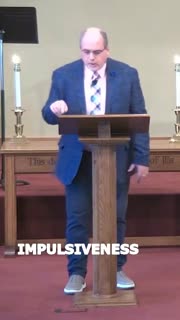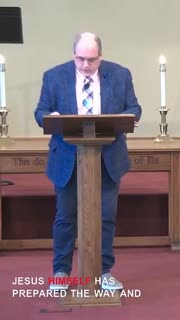Samson: Strength, Impulsiveness, and Divine Redemption
Devotional
Sermon Summary
Bible Study Guide
Sermon Clips
### Quotes for outreach
1. "When impulsiveness and infatuations replace calm obedience, we're headed for a big fall. Think of the Titanic, full steam ahead, going towards that iceberg." [42:17] (17 seconds)
2. "Jesus himself has prepared the way and the means. He's the founder and perfecter of our faith, who for the joy set before him endured even the cross. He did not give himself in to many temptations as Samson did." [51:13] (16 seconds)
3. "Jesus too was an unlikely hero. Just think about that day at Calvary with all the people watching and looking at him hung upon a cross. At that point, it doesn't look like a glorious day. It doesn't look like a glorious victor, does it? It looks like a great defeat. But in fact, Jesus made it possible that we too could be unlikely heroes in a day and age that desperately needs people like us to stand up for our faith." [52:52] (30 seconds)
### Quotes for members
1. "Samson's saga mirrors the story of Israel in the book of Judges. What do I mean by that? Well, you see, Samson was supposed to be a holy man set apart for God's use. Israel was supposed to be a holy nation set apart for God's use. Samson went after other women. Israel ran after false gods. Only in the most absurd situations would Samson ever cry out to God. Israel, too, throughout this book, only as a last resort, would ever turn back to God." [46:45] (41 seconds)
2. "Like Samson too, we were chosen before the foundation of the world. We too were called to be holy people, or as the apostle Peter says in his first epistle, a holy nation, God's people, his divine possession, his witnesses in a sad and broken generation. That's who we're called to be. And like Samson, we're actually empowered with spiritual gifts. God's intention with Samson, and his intention with his church, is to reveal his glory to the world through us, to expose its false gods, to show them up for the shams that they really are." [49:19] (45 seconds)
3. "Friends, the lesson of judges is that obedience is always more vital than outstanding gifting. We need to remember that. Yet, even where Samson was self-indulgently willful, made a lot of mistakes. The work of God's grace and protection over the people of God shines all the more brighter. Even though he did all these things, God still used him to destroy a God, a false God, in that world." [54:49] (60 seconds)
Ask a question about this sermon
1. "When impulsiveness and infatuations replace calm obedience, we're headed for a big fall. Think of the Titanic, full steam ahead, going towards that iceberg." [42:17] (17 seconds)
2. "Jesus himself has prepared the way and the means. He's the founder and perfecter of our faith, who for the joy set before him endured even the cross. He did not give himself in to many temptations as Samson did." [51:13] (16 seconds)
3. "Jesus too was an unlikely hero. Just think about that day at Calvary with all the people watching and looking at him hung upon a cross. At that point, it doesn't look like a glorious day. It doesn't look like a glorious victor, does it? It looks like a great defeat. But in fact, Jesus made it possible that we too could be unlikely heroes in a day and age that desperately needs people like us to stand up for our faith." [52:52] (30 seconds)
### Quotes for members
1. "Samson's saga mirrors the story of Israel in the book of Judges. What do I mean by that? Well, you see, Samson was supposed to be a holy man set apart for God's use. Israel was supposed to be a holy nation set apart for God's use. Samson went after other women. Israel ran after false gods. Only in the most absurd situations would Samson ever cry out to God. Israel, too, throughout this book, only as a last resort, would ever turn back to God." [46:45] (41 seconds)
2. "Like Samson too, we were chosen before the foundation of the world. We too were called to be holy people, or as the apostle Peter says in his first epistle, a holy nation, God's people, his divine possession, his witnesses in a sad and broken generation. That's who we're called to be. And like Samson, we're actually empowered with spiritual gifts. God's intention with Samson, and his intention with his church, is to reveal his glory to the world through us, to expose its false gods, to show them up for the shams that they really are." [49:19] (45 seconds)
3. "Friends, the lesson of judges is that obedience is always more vital than outstanding gifting. We need to remember that. Yet, even where Samson was self-indulgently willful, made a lot of mistakes. The work of God's grace and protection over the people of God shines all the more brighter. Even though he did all these things, God still used him to destroy a God, a false God, in that world." [54:49] (60 seconds)






